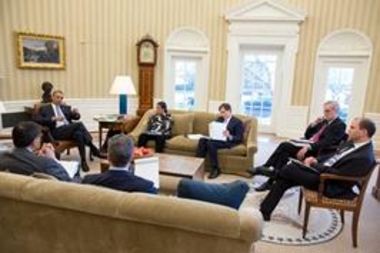Western leaders gather in bid to isolate Russia

The Hague, Netherlands (AP) — President Barack Obama gathered with world leaders in a day of delicate diplomacy, as he sought to rally the international community Monday around efforts to isolate Russia following its incursion into Ukraine.
Nuclear terrorism was the official topic as Obama and other world leaders streamed in to a convention center in The Hague for a two-day nuclear security summit. But the real focus was on a hurriedly scheduled meeting of the Group of Seven industrialized economies on the sidelines of the summit to address the crisis in Ukraine.
The U.S., Britain, Canada, France, Germany, Italy and Japan were to participate — but not Russia. Discussion among Obama and his G-7 counterparts will center on economic aid to Ukraine, while at the same time seek to segregate Russian President Vladimir Putin from the exclusive group, which Russia usually joins in Group of Eight meetings.
In a show of western solidarity, Obama declared shortly after arriving in the Netherlands on Monday morning that the U.S. and Europe stand together behind Ukraine.
"We're united in imposing a cost on Russia for its actions so far," Obama said after meeting with Dutch Prime Minister Mark Rutte.
Obama's deputy national security adviser Ben Rhodes said the G-7 meeting was aimed at foreshadowing "what economic sanctions Russia will be faced with if it continues down this course." He said the countries also would discuss international efforts to assist the fledgling Ukrainian government, as well as what the G-7's relationship with Russia will be if the current standoff continues.
However, Rhodes indicated that the U.S. and other nations were not prepared to formally kick Russia out of the Group of Eight. "The door is open to Russia to deescalate the situation," he said.
Rhodes said that while the G-7 would not levy joint sanctions on behalf of the alliance, the goal was to have individual members coordinate their approach as they levy future penalties. "We would like to see a steady ratcheting up of that pressure," he said.
Obama also sought to coax support from one of Moscow's closest allies as he held one-on-one talks with Chinese President Xi Jinping. China often sides with Russia in disputes with the West, but U.S. officials have been appealing to Beijing's well-known opposition to outside interference in another nation's domestic affairs.
Obama treaded carefully in statements with Xi before their meeting, saying only that they planned to discuss the situation in Ukraine.
"I believe ultimately, that by working together, China and the United States can help strengthen international law and respect for the sovereignty of nations and establish the kind of rules internationally that allow all peoples to thrive," Obama said in a subtle appeal for Chinese support.
China, a frequent Russian ally, abstained a week ago from voting on a United Nations Security Council resolution declaring Crimea's secession referendum illegal. With Russia vetoing the measure and the 13 other council members voting in favor, China's abstention served to isolate Moscow internationally.
The long-planned nuclear summit kicked off with a highly theatrical opening ceremony, plus an announcement that Japan would turn over to the U.S. more than 700 pounds of weapons-grade plutonium and a supply of highly-enriched uranium, a victory for Obama's efforts to secure nuclear materials around the world.
But no issue commands more of Obama's and Europe's attention than Russia's annexation of the Crimean Peninsula and the fear that Moscow could decide to expand further into Ukraine.
Obama also is attempting to use the weeklong trip to personally reconnect not only with Europe but Asia and the Middle East, all strategically crucial regions with their own tensions and qualms about the U.S.
On Tuesday, Obama plans a joint meeting with Japanese Prime Minister Shinzo Abe and South Korean President Park Geun-hye, a session preceded by a sit-down with Prince Mohamed bin Zayed, crown prince of Abu Dhabi, the richest emirate in the United Arab Emirates federation.
More broadly, the Ukraine crisis will test Obama's ability to forge a unified and forceful stance against Russia from European leaders who are alarmed by Putin's moves but whose economies are dependent on Russian energy and trade.
In an interview with the Dutch newspaper de Volkskrant published before he arrived Monday, Obama said his message to European leaders is that Putin needs to "understand the economic and political consequences of his actions in Ukraine."
Still, he said he does not view Europe as a battleground between the East and the West.
"That's the kind of thinking that should have ended with the Cold War," Obama said. "On the contrary, it's important that Ukraine have good relations with the United States, Russia, and Europe."
In a counterpoint to Obama and his G-7 partners, a group of five major emerging economies — Brazil, Russia, India, China and South Africa — issued a statement Monday opposing sanctions and urging nations to work through the U.N. instead. The so-called BRICS nations said hostile language, sanctions and force do not "contribute to a sustainable and peaceful solution."
___
by Jim Kuhnhenn, Associated Press
Copyright 2014 The Associated Press. All rights reserved. This material may not be published, broadcast, rewritten or redistributed.
The Gayly – March 24, 2014 @ 12:25pm





